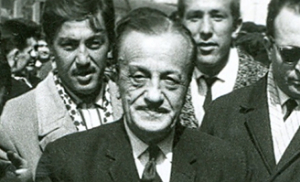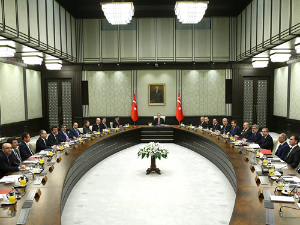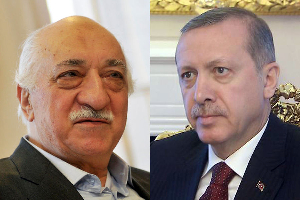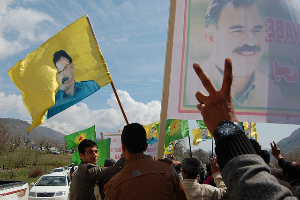The AKP and Turkey’s Long Tradition of Islamo-Fascism
By Toni Alaranta (vol. 8, no. 3 of the Turkey Analyst)
Those who claim that democracy in Turkey has been handicapped because of the repressive “Kemalist” regime overlook that the conservative right has totally dominated Turkish politics. It is the traditions of the Turkish right that need to be scrutinized in the search for the matrix of current undemocratic practices. The Turkish Islamist poet and political ideologue Necip Fazıl Kısakürek is a key figure in this context. He propagated for a totalitarian Islamist-fascist regime in Turkey, to be ruled by an Islamic version of a Führer. And today representatives of the AKP point out that understanding Kısakürek is a precondition to understand the great “cause” (“dava”) that the AKP represents.

The HDP's Election Gambit and Turkey's Tolling Alarm Bells
By Gareth Jenkins (vol. 8, no. 2 of the Turkey Analyst)
On January 13, 2015, Selahattin Demirtaş, the co-chair of the pro-Kurdish Peoples’ Democratic Party (HDP), announced that the HDP will run as a party in the June 7, 2015 general election. If the HDP fails to cross the 10 per cent national electoral threshold not only will the country’s Kurds no longer have their own voice in parliament but nearly all of the seats in predominantly Kurdish areas are likely to go to the ruling Justice and Development Party (AKP), thus boosting President Recep Tayyip Erdoğan’s hopes of changing the constitution and introducing a presidential or semi-presidential system.

The Long Road that Led to the AKP’s “New Turkey”
By Fatih Yaslı (vol. 28, no. 1 of the Turkey Analyst)
The regime that the AKP is constructing certainly deserves to be defined as “new.” However, a proper understanding of the rise of the Islamists requires that their ascent is put in the right historical context, and that the true nature of the old Turkish regime is appreciated. Turkey’s Islamization has a long prehistory. It has been a long time since the radicalism of Kemalism was discarded. Instead, religion and conservatism have been consistently promoted in the name of anti-socialism.

Narrative Veils: Erdogan, the AKP and the Gulenist Arrests
By Gareth Jenkins (vol. 7, no. 23 of the Turkey Analyst)
On December 14, 2014, the Turkish police staged early morning raids in 13 provinces across the country following the issuing of arrest warrants for 31 alleged members of the Gülen Movement on terrorism charges. Those detained included six journalists, prompting claims in the national and international media that the arrests were another example of President Recep Tayyip Erdoğan’s increasing suppression of freedom of expression. In fact, the narratives of the AKP and the Gülen Movement about the arrests are both attempts to coat a power struggle with the gloss of a commitment to principle.

The Kurdish Nationalist Movement and the Dialogue with Öcalan
By Gareth Jenkins (vol. 7, no. 22 of the Turkey Analyst)
On November 29, 2014, Abdullah Öcalan, the imprisoned founder of the Kurdistan Workers’ Party (PKK) told a visiting delegation from the pro-Kurdish Peoples’ Democratic Party (HDP) that the Kurdish issue could be resolved – and the PKK’s 30 year-old insurgency ended – within four to five months provided that the ruling Justice and Development Party (AKP) took the appropriate measures. In reality, not only is there little prospect of breakthrough but frustration at the lack of progress has begun to highlight the struggle for relevance between different elements within the Kurdish nationalist movement.








